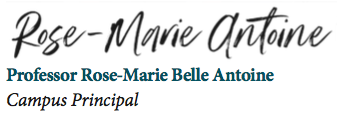As the academic year 2022-2023 at the St Augustine campus comes to an end, we continue to commemorate the 75th anniversary of The University of the West Indies. Yet, other special anniversaries are part of this year. One such is the remembrance of a crucial – and timely – historical event that took place in Trinidad and Tobago, but reverberated across the Caribbean. On April 20 and 21, The UWI’s Sir Arthur Lewis Institute of Social and Economic Studies (SALISES) in partnership with The National Joint Action Committee (NJAC), held the “Conference on the 50th Anniversary of the Black Power Revolution”.

In 1970, over a period of 55 days, the youth of Trinidad and Tobago, led by students of The UWI St Augustine campus, engaged in revolutionary action to fight for racial, social, and economic justice. It was part of a diaspora awakening of black pride. That incredible moment, described by some as the most transformative period in our history, seems rarely mentioned or acknowledged, even as our society has enjoyed the enormous benefits it brought us, in what, with hindsight, we identify as a social revolution.
As eminent historian Professor Brinsley Samaroo describes, “... the youth of the nation were of the firm view that the black and brown people, the majority of the nation, were in government, but not in control. Power was being exercised by a cartel…. Accompanying this economic control was a well-calibrated system of training which socialised the subjects into an affection for things European and not Caribbean.”
It was a time when race discrimination influenced where people could live, work, and recreate. Race concerns intersected with economic disenfranchisement in the young nation-state. At the time, economic and social mobility were severely underdeveloped for black and brown peoples. Perhaps, most perniciously, social norms were heavily impacted by inegalitarian notions of race and cultural superiority. The Black Power Movement was to strongly challenge these notions.
This brought about not just changes to the psyche of the nation, but important structural reforms. These improvements reached into the financial and economic sectors and the government of the day was propelled into establishing cooperatives and other financial structures that were more inclusive.
The Black Power Revolution confronted society and forced it to improve in many ways. East Indian and African people were able to take their equal place in sectors such as banking and tourism, as the government increased state involvement in the economy and the financial sector. Senior positions in state and religious institutions were made available to qualified black and brown people.
Significantly, it was one of the few times in our history that there was a successful thrust toward unity between East Indian and African people. This was displayed in the March to Caroni on March 12, 1970. The energy for transformation was enormous and effective, and that transformation impacted the internalised effects of colonialism on our people.
As the Caribbean’s premier institution of learning, and one committed to genuine development, The UWI must celebrate these crucial moments of our region’s history. The Black Power Conference brought together scholars from throughout the region, as well as members of NJAC – including some of the revolutionaries themselves – for the two-day event.
The Black Power Revolution demonstrated that by embracing equality and justice, giving people the opportunity to excel, and combatting ideas and culture that breed feelings of inferiority and subservience, the society can grow.
We celebrate the role that this institution, through its students, played in the Black Power Revolution. NJAC was formed by members of The UWI St Augustine Student’s Guild, and its founding president, Makandal Daaga, is regarded as a figure of great national importance. The Faculty of Law established the Makandal Daaga Law Scholarship to give students with a demonstrable record of advocacy for social justice the opportunity to study at this competitive faculty and become lawyers, once they met basic matriculation requirements. In this way, we encourage the continuation of that revolutionary spirit and provide activists important tools to create social change.
Even as we commemorate the gains of the 1970 revolution, we acknowledge that our country is faced with several persistent challenges that must be addressed, and that the goals and aspirations of the Black Power Revolution have not been fully realised. While many have achieved success due to their hard work and excellence, there are many others who fell by the wayside, unable to emerge from a society that is still not as egalitarian, or as meritocratic as we need in order to attain genuine development. The remains and strains of our post-colonial societies are still evident.
The Black Power Revolution demonstrated that by embracing equality and justice, giving people the opportunity to excel, and combatting ideas and culture that breed feelings of inferiority and subservience, the society can grow. It benefits through new economic activity, greater human capital, and more confident and engaged citizens with a stronger sense of national and regional identity.
We celebrate our revolutionaries, young people who put their freedom, and indeed their lives at risk, for the betterment of Trinidad and Tobago. We look to this new generation of young people to emulate their revolutionary ideals of justice, freedom, and equality to meet the challenges of our society today and bring about the renewal that is so sorely needed.
